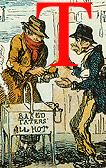Thanks to the author for sharing this review, which originally appeared in Economic History Review (2000): 366-67. — George P. Landow.

here are many extraordinary gaps in the history of the Irish Famine. Processes begun in 1945, the centenary of the start of the Famine, led eventually and painfully to the publication of the Edwards and Williams collection, The Great Famine (1956), and the Woodham-Smith volume. The Great Hunger (1962). In 1989 Vaughan's work of synthesis A new history of Ireland, volume V, prepared the way for new thinking, one manifestation of which was the volume edited by the historian of nutrition, E. Margaret Crawford, Famine: the Irish experience. As the 150th anniversary of the start of the Famine loomed, there were impulses throughout the world towards commemoration, which a number of us attempted to direct towards filling die gaps in the literature. The volume under review here is a permanent record of one of those attempts, the conference held at the Ulster-American Folk Park in 1995. It is a snapshot of processes then under way and still going on. We can think of them as having two parts. First, there is the task of finding and redefining the areas in which study of the Irish Famine might take place. Secondly there is the task of re-integrating the study of the Irish Famine within the study of Irish history with its many sub-departments. Noting that those sub-departments will have connections with areas of scholarship outside Irish history—which may regard the Irish Famine as an uninteresting anomaly—it needs to be stressed that scholars of the Irish diaspora cannot ignore the Famine.
The opening chapter, by Donald Akenson, says that we now have 'literally scores of studies' of the Irish Famine. If only this were true. We have seen much trudging over familiar ground, familiar arguments, and familiar sources, but nor enough new scholarly research. Indeed, it has been a struggle to find a way of reading positively the chapter by Akenson. Taken at face value, it slams the door on the whole notion of the comparative study of diasporas. This cannot have been intended. It may be read as a contribution to the theology of migration—though theologians would quarrel with his elision of 'galut' with 'diaspora'. All migrants (not just the Irish) have a theology—whether they believe in gods or not. Key themes are hope and retribution. The most significant chapters in best addressing the subjects of the book's sub-title, emigration and famine, are by Robert Scally on 'External forces in the Famine emigration' and by Patrick Fitzgerald on 'Changing patterns of crisis'. The Famine migrations occurred because the Famine migrations were possible, and Scally's exploration of what he calls 'the Liverpool system' shows how the same commercial processes and the same ships which took food out of Ireland were available to Irish families in their attempts to rescue themselves. Unfortunately, Scally's chapter is not referenced—it is still in conference paper form. Fitzgerald's survey of the patterns of Irish subsistence crises covers familiar ground, but stresses—to speak bluntly—how much famine is a learning experience for those who survive, human beings have a special ability to pass on knowledge from generation to generation.
Of the 18 contributors to this volume perhaps four or five can fairly be called famine studies specialists—Patrick Fitzgerald, Frank Neal, Michael Quigley, James Grant, and Crawford herself. All the others bring an Irish Famine slant to an existing area of interest—manifestations of the second task outlined above. Some criticisms of this volume may sound technical. For example, there was in the Edwards and Williams volume an excellent chapter by William P. MacArthur on the medical history of the Famine, but unfortunately the editors lost Mac- Arthur's notes. The task of reconstructing them is in hand, but there are evident problems in relying on MacArthur alone as a source for the fine detail of the history.
None the less this volume remains useful, and important, to those of us who would give the Irish Famine its due place in Irish history and in Irish diaspora history. It reports properly on its parent conference and clarifies the many problems that still face us.
Related Material
Bibliography
The Hungry Stream: Essays on Emigration and Famine. Ed. E. Margaret Crawford. Belfast: the Institute of Irish Studies at the Queen's University of Belfast and the Centre for Emigration Studies at the Ulster-American Folk Park, 1997. Pp. x + 221. 10 tabs. £25; pbk. £9.50)
Last modified 22 October 2014